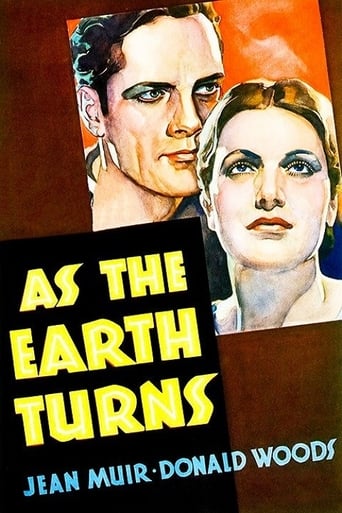

Some things I liked some I did not.
... View MorePlot so thin, it passes unnoticed.
... View MoreA lot of fun.
... View MoreThrough painfully honest and emotional moments, the movie becomes irresistibly relatable
... View MoreI didn't expect much from this film, but it really intrigued me. So much so that I want to find a copy of the book by the same name, published in 1933, and read the entire story.The film focuses on three Maine farming families, all interconnected in some way. First there is the newly arrived immigrant Janowski family. They were encouraged to move there by their son, Stan, who gave up a career playing the violin in favor of farming.Then there is the family headed by Mark and his second wife Cora. For Cora, what's his is hers and what's hers is hers. Part of her attitude is caused by the fact that she and her daughter by her first marriage hate the farming country of Maine and miss the big city.The third family is headed by Mil and George. Mil openly goes around complaining about how she hates this kind of life and how shiftless George is - and he really is lazy. Mil is always advising any grown girl who will listen to her not to marry a farmer, don't do what she did and get "stuck", go to the city, do something with her life! When George's laziness is the cause of a needed cow dying and he goes to Mark to borrow one of his cows, and this prevents Cora's oldest daughter from going to secretarial school, all hell breaks loose. As one kid says "Who would know one cow breaking its leg could cause so much trouble".The complicating factor is that Jean Muir as Jen, Mark's daughter but not Cora's, is content with this life, even though it is a hard one. And she and the Janowski's son Stan begin to develop feelings for one another. But Jen does not want to end up like Mil and George, so she insists on more time for making a commitment. She wants Stan to be sure and have no regrets. Stan sees this as rejection. And then there is Cora's oldest daughter, on the prowl for any man that will take her out of this place she considers a frigid hell.It really is a complex soap opera set in an unusual place. The one thing that does not quite fit in is the solution to their ruts and boredom that the unhappy members of these families think they will find in the city. The book was written about Maine farmers in the 1920's before the crash. By the time this film was released there were no jobs there, and if you owned food producing land you might lead a boring life, but you would eat.I'd recommend it for any number of reasons, but primarily it was well acted and it was a rare lead part for Jean Muir. She was mainly a supporting player as was the rest of the cast, plus it is a rare look into a world of farm families in a remote place where so many of the individuals were unhappy and restless, when farm life was generally portrayed as happy in most other films of the 1930's and 40's.
... View MoreYes, there is a simpler life somewhere out there, but truthfully, it really ain't so simple. Country folk in Maine have to deal with many issues-the elements of weather, lack of money for the replacement of cattle ("It broke its leg and I had to shoot it", the farmer actually gets to say), desires for college and land sold before they could buy it, and bitter resentments hidden inside each member of this family. This slice of life drama opens on a beautiful winter setting (straight out of Currier and Ives and Saturday Evening Post) is a vision that these people's lives are quiet as complicated as city folks, only with different characteristics.The plot is slim, but beautifully presented and well acted by a large ensemble cast lead by Jean Muir, a talented and beautiful leading lady whose career was rather short-lived and filled with controversy. "The Wizard of Oz's" Clara Blandick pre-dated her Kansas farm woman here as the family matriarch, and gives a multi-faceted performance being simultaneously loving, resentful and strong. The handsome Donald Woods is rather bland as the next door neighbor, son of Polish immigrants who falls in love with the indecisive Muir but turns to her selfish younger sister when Muir turns down his marriage proposal. The characterizations of the Polish parents is fortunately lacking in stereotype, which usually presents them as overly cheery and eager to please in their new country. These elders originally settled in Boston before taking their chance in the country, so they know a bit more about American life than some of the uppity country folk think they do. Subtle prejudices are revealed towards them, a realistic touch for the hard-hitting depression era.This film reminds us of the importance of the land and particularly reminded me of my growing up in the country in my pre-teen years with the memories of the picturesque farmhouse, huge barn, peach orchards and memories of people who seemed provincial but really were just fighting for their own dreams and ideals while the rest of the country looked on them as simpletons.
... View MoreThere is nothing much new in this story of poor farmers in Maine: their trials and tribulations, their hopes and dreams and the Polish family that bought the abandoned farm down the road. However, the performances are excellent. Jean Muir is luminous as the hard-working drudge who wants something more without quite understanding what, William Janney is her brother who is working his way through college and Donald Woods is as good in his miscast role as he can be: he is supposed to be Polish and a violinist, but his faking is as mismatched to the music as can be. Good thing that what he really wants to be is a farmer! But despite the excellence of the acting,it's largely repetitious of characters again and again: the kids are tired of the hard work, the father is understanding, the mother is shrill and grasping and so forth. After a while, it's a little too much.Fans of star watching should keep a sharp eye out: Shirley Temple is listed on the IMDb as having her last uncredited role in this, the same year she became the biggest star at Fox. Interestingly, I was unable to spot her, nor is she listed in the AFI Catalogue as appearing here. If you do see her here, please let me know where.
... View MoreNot exciting, not engrossing, but still interesting for its clear-cut characters involved in daily life.That life is being lived, or at least survived, in the frozen wastes of Maine ... and in fact the very first scene is snowy wintertime, with a temperature of 12 below zero.To those of us used to sunnier climes, perhaps it is a puzzle just why anyone would want to be in any place that suffered through those kinds of winters; and that anyone could enjoy such winters is, honestly, beyond me, and I spent some three winters in North (brrrr) Dakota.Even more puzzling to us erstwhile desert-dwellers is that anyone could actually FARM such an environment.In truth, though, that is part of what makes this movie as interesting as it is.There really is a ring of truth: So many of the people do not, in fact, want to be farmers in snowy Maine, and that is the basis of some of the conflict that makes up this drama.Most of the players are almost unknown today, although IMDb listing shows Shirley Temple in an unbilled bit. I didn't see her, but I'll look harder next time.Despite their lack of fame, they show acting ability, and are nearly all thoroughly believable in this worthwhile film.Added 11 January 2017: "As the Earth Turns" is available on YouTube, but for some reason in two parts and you will have to search for both. I hope you do.
... View More